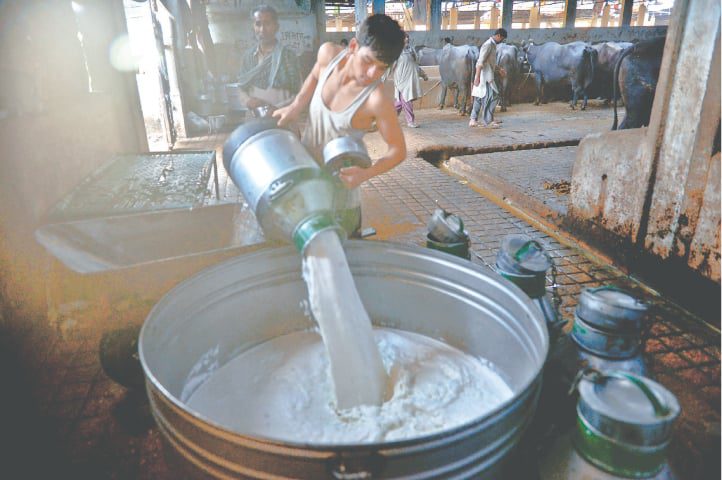The Competition Commission of Pakistan (CCP) has concluded an investigation into the dairy sector, concluding that three main dairy associations were prima facie involved in cartelization and price fixing of milk in the country’s largest metropolitan area, Karachi.
The CCP launched the probe in response to media reports and concerns expressed in a letter received from a leading consumer organisation regarding the increase in milk prices declared by dairy associations at the farm, wholesale, and retail levels in Karachi and its nearby districts.
Several other dairy associations were also implicated in the price-fixing of milk, according to media sources. It was particularly stated that the Dairy Farmers Association (DFA) Karachi has increased the price of milk from Rs. 110 per litre to Rs. 120 per litre effective immediately, compared to the official government rate of Rs. 94 per litre.
Because the government set the milk price at Rs. 94 per litre and the association collusively/collectively sold it at Rs. 120 per litre, this resulted in a daily liability of approximately Rs. 130 million being passed on to consumers and an annual impact of approximately Rs. 47 billion on consumers in Karachi and its adjacent areas.
On the other side, the market was distorted by the lack of price competition, and consumers were forced to pay unreasonable prices regardless of the milk’s quality.
Milk is a necessary component of desi ghee, butter, cheese, a variety of confectioneries, and various cosmetics. As a result, a change in the price of milk has a ripple effect on the pricing of all of these and other products across the country.
According to an analysis of Karachi’s milk sector, the city’s fresh milk is supplied by five cattle colonies located on the city’s outskirts. Milk is distributed through a supply chain that includes dairy farmers, wholesalers, and retailers. Milk is supplied to retailers via an annual contract called a ‘bandhi,’ in which the price and quantity of milk purchased are determined by several dairy and retailer associations. Karachi is also unique in that milk can be purchased at the Lee (Bolton) market’s mandi.
According to the inquiry committee, the Commissioner Karachi Division notifies prices at all tiers of the milk supply chain, with the most recent notification being issued on March 14, 2018, setting rates per litre at Rs. 85 for dairy farmers, Rs. 88.75 for wholesalers, and Rs. 94 for retailers.
However, official data indicates that the declared prices are not followed, owing mostly to the involvement of several associations in the milk supply chain.
In Karachi, there are three dairy farmer associations:
- Karachi Dairy & Cattle Farmers Association (DCFAK);
- Karachi Dairy Farmers Association (DFAK);
- Association of Karachi Dairy Farmers (KDFA).
In February 2021, an informant provided video footage of DCFAK representatives announcing revised milk pricing in Karachi. This was followed by the President of DCFAK appearing on various television programmes to announce that milk would no longer be available to consumers in Karachi at the previous rate of Rs. 120 and that his association would not reverse the price rise.
Similarly, the probe report included President DCFAK’s television appearances in which he announces increased milk pricing for July 2020.
According to statements made by representatives of numerous merchants and a dairy farmer, all three dairy associations in Karachi had formed a cartel and were declaring bandhi pricing. If a store refused to adhere to the association’s established pricing, his milk supply would be halted.
After considering the following: Representatives of retailers, dairy producers, and The above-mentioned camera footage established that DCFAK was principally responsible for fixing the rates of fresh milk in Karachi in July 2020 and February 2021.
Additionally, it appears as though the other two dairy farmer groups – DFAK and KDFA – followed suit, as milk prices in the relevant market increased immediately following DCFAK’s announcement of new rates. The rate increase, it is noted, could not have occurred without the cooperation of all three dairy associations.
Price data indicates that milk prices in Karachi increased immediately following the DCFAK’s rate announcement. Prices increased from an average of Rs. 110 per litre to Rs. 120 per litre in July 2020, and from Rs. 120 to Rs. 130 per litre in March 2021.
Once dairy farmers increase the bandhi rate, the effect on prices at all other levels of the supply chain, including wholesalers and retailers, will be seen.
A city-by-city study of Karachi, Lahore, and Islamabad/Rawalpindi reveals that only Karachi has a consistent milk price, whilst all other cities have varying pricing. This homogeneity in pricing also suggests that the various dairy associations have fixed their rates.
As a result, their decisions to fix the bandhi rate in the relevant market violate Section 4 of the Competition Act 2010.
Rate announcements or simply recommendations by associations to set the price of milk are prima facie violations of the Competition Act, 2010’s Section 4(1) read with Section 4(2)(a). This rate serves as a reference point, with the product being priced at or near this level.
In light of the findings, the inquiry committee suggested that the Commission consider commencing actions against DCFAK, DFAK, and KDFA under Section 30 of the Act.
